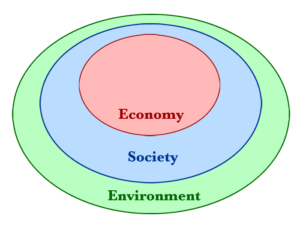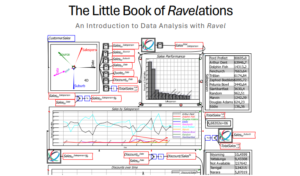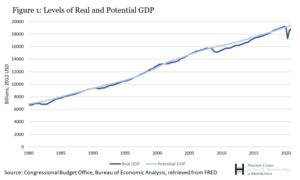Ecological economics, to me, is simultaneously fascinating and depressing.
Fascinating because it starts with the natural sciences of ecology, biology, and thermodynamics.
Depressing because the waste we’re creating from our technology and industry is changing our biosphere faster than we as a civilization might be able to accommodate, or survive.
This post is a summary of chapter 10 (Ecological economics) of the book Contending Perspective in Economics by John T Harvey Ph.D. I’m summarizing this book because it’s such a great little book (151 pages, but packed full of insights).
For the record, the copy I bought was an edition without this chapter, but in a YouTube video lecture, Professor Harvey offered to send this chapter via email to anyone who ask, so I asked.
Table of Contents
Origin
Ecological economics started in the 1980s when some people started overlaying the principles of economics on top of the principles of ecology and thermodynamics.
It is not one unified school of thought but is fractured into two main groups which Professor Harvey calls:
- Environmental economists
- Ecological economists
It is a collaboration between the academic disciplines of natural sciences and economics, and it has to be this way.
Why? Because economists do not study energy conservation and thermodynamics and biologists do not study theories of the business cycle.
The main ideas
The main ideas, of both subgroups, are:
- Our biosphere is finite.
- Energy is essential for life and economic activity.
- Natural laws don’t bend even when it would be convient for us if they did.
- The industrial waste we produce has to go somewhere, and we have only one planet.
They see problems ahead
One way or another.
They feel the evidence that human activity is warming the biosphere far faster than ever before is beyond dispute.
And the natural science people involved extrapolate that into our fairly near future and see serious problems.
They see climate change as an existential threat that we WILL deal with, one way or another, ready or not.
And disagree on what we should/must do
Both environmental economists and ecological economists believe our orientation to market systems has contributed to the problem, as creating waste is part of generating profits, and there is very little profit is getting rid of it.
This is why it’s piling up in the biosphere.
How to deal with it is where the environmental economists and the ecological economists disagree.
Environmental economists believe
- Capitalism is a quasi-natural phemonoma which must form the basis of our solutions.
- Creating the right market incentives is key.
- And speaking to businesses in the language of profit and loss is necessary, as that’s the language they speak.
- Cost benefit frameworks work, but we need to assign economic values (dollars, pounds, yen, etc) to things like life expentency, infant mortality, etc.
- Not only can things be fixed with a capitalist system, there is no better method.
Ecological economists believe
- Natural and biological laws do not negotiate.
- The planet has limited resources.
- Our economies run within the biosphere that sustains us.
- The environment can handle some of the waste we’re created, but not nearly as much as we’re creating, at least not as fast as we’re creating it.
- Capitalism requires the continual production of more goods, which creates more waste.
- And capitalism requires we WANT more goods. Economic growth requires it.
- But, “Growth for growths sake” is the ideology of cancer.
- Our economies do not exist on their own, but rather reflect our values.
- Capitalism is a cultural construction, not a set of immutable laws.
- The market systems that created the problem will never enable us to fix it.
The paradox of ecological economics
Market systems are not capable of solving this problem they created, but in order to communicate with business and political leaders, you must speak to them in a language they understand, and that is the language of market systems.
There is no affecting policy change if effective communications with the people who make policy doesn’t happen.
Ecological economic policy
This is going to be tough.
The core issue is we are producing industrial waste faster than the earth can accommodate it.
Or to be clearer, the earth will be fine, but the amount of industrial waste we’re producing threatens the earth’s ability to sustain us.
Our industrial activities are hastening climatic changes that threaten not only our social structures but possibly the ability for us to continue as a complex civilization, and possibly our very existence, depending on how bad we let it get.
Unequal causes, unequal costs
But…
The richest countries responsible for creating the bulk of that waste are also the ones least likely to feel the near-term effects.
And when desperate people adopt desperate measures, we can expect to see increases in nationalism, racism, xenophobia, extremism of other sorts, and very large migrations of people from areas that no longer support the populations living there.
Which might be Tucson (too hot) or Miami (too wet) or central America or sub-Saharan Africa or Pakistan.
Mitigation means what?
We prevent this by getting the primary offenders, the most industrial of nations, who do the most polluting, to take action.
Which we’re clearly not rushing into.
We’ve got to bend a little, or maybe A LOT, on our philosophy of “If it’s not profitable, we’re not doing it”.
We’ve got to fund climate mitigation efforts the same way we fund social services of police, fire, libraries, and other services we do not expect to turn a profit.
Or maybe we’ve got to fund it like WW2 when the US government bought half of the entire US economic output for the duration of the war in order to devote resources to that existential threat.
Method
The starting point for ecological economists is the physical world, as described by what we’ve learned through the scientific method, with special attention to how we can not violate the laws of thermodynamics.
All ecological economic models must accept that we take energy inputs, and produce both useful stuff and waste.
In terms of technique, ecological economists use a variety: agent-based modeling, input-output, systems dynamics, and simulations.
Ecologist economists, like institutionalists and feminist economists, reject the notion that economics is free of value judgments.
Some take the last idea to an extreme and believe that for some economists, their acceptance of capitalism as THE way to model economies is akin to religion.
Due to ecological economics being grounded in natural sciences and accepting ideas from various economic schools of thought, ecological economics is necessarily multidisciplinary and pluralistic.
Views of human nature and justice
Humans are seen as social animals, first and foremost.
Culture and socialization are key to who we are, what we believe, and how we behave.
Power too is an important concept.
They acknowledge that in our societies and in our economies, power is used by some groups to create rules that favor them over other groups.
The core of their concept of justice is that EVERYONE alive now or in the future deserves access to clean air, drinkable water, pollution-free environments, and safe levels of exposure to the benefits, and harm, that exposure to the sun provides.
These are things that should be available to everyone, not just the wealthier people.
In fact, they believe the wealthier people of Earth have, intentionally or otherwise, created the inequality that denies such access to the poorer of us.
Criticisms
The main criticism comes from their rejection of using market-based solutions to solve a problem created by the incentives inherent in having used a market-based system.
Now, this is true of the ecological economists, not the environmental economists.
Environmental economists accept the need for market-based solutions as a given and this is based on their acceptance of capitalism as a quasi-natural system that is responsible for the material wealth of our modern civilization.



